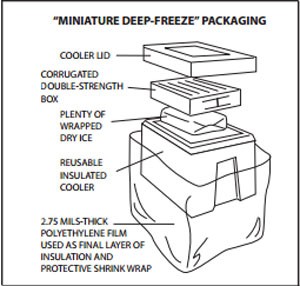Foodsafety.gov is offering tips for safely sending food through the mail this holiday season. If the food you are packing is perishable, food poisoning is a risk. And if you are ordering food from a company, you should make sure they understand how to handle perishable goods.
When ordering from a company, make sure that they send meats, poultry, and processed foods such as salads and potatoes, cold or frozen and packed with a cold source. The preferred cold source is dry ice to keep the package temperature as low as possible. The food should also be packed in a foam container or a heavily corrugated cardboard container to hold in the cold. And the food should be delivered as quickly as possible, preferably overnight.
 If you are packing food yourself to send through the mail, construct a “miniature deep-freeze” packaging system as shown on the right. The food should be packaged inside a reusable insulated cooler, with wrapped dry ice. A polyethylene film should be used as a final layer of insulation. Make sure the food is well chilled before you pack it too. This system is designed to keep food cold, not to chill it.
If you are packing food yourself to send through the mail, construct a “miniature deep-freeze” packaging system as shown on the right. The food should be packaged inside a reusable insulated cooler, with wrapped dry ice. A polyethylene film should be used as a final layer of insulation. Make sure the food is well chilled before you pack it too. This system is designed to keep food cold, not to chill it.
Make sure that the person you are sending the package to knows it is coming to them, and that the food should be immediately refrigerated or frozen. And let the person know that the food should arrive frozen or partially frozen with ice crystals visible, or below 40°F as measured with a food thermometer. Even smoked, cured, vacuum-packed, and fully cooked food has to be kept cold.
If the food arrives thawed in water, or registers above 40°F, throw it out. Any perishable food held between 40°F and 140°F will support the growth of pathogenic bacteria. And those bacteria will not change the appearance, taste, smell, or texture of the food. When in doubt, throw it out.




